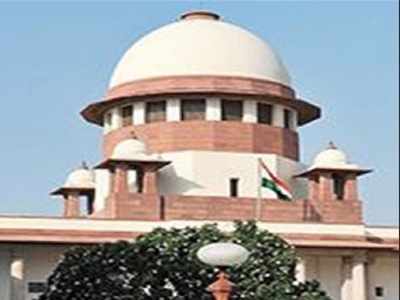- News
- India News
- Now, five-judge SC bench to hear EWS quota pleas
Trending
This story is from August 6, 2020
Now, five-judge SC bench to hear EWS quota pleas
The Supreme Court on Wednesday referred to a constitution bench of five-judges, a batch of pleas and transfer petitions challenging the Centre’s decision to grant 10% reservation in jobs and education to economically weaker section and Constitution (103 amendment) Act 2019.

NEW DELHI: The Supreme Court on Wednesday referred to a constitution bench of five-judges, a batch of pleas and transfer petitions challenging the Centre’s decision to grant 10% reservation in jobs and education to economically weaker section and Constitution (103 amendment) Act 2019. A bench of Chief Justie of India SA Bobde, R Subhash Reddy and BR Gavai said that it is of the view that the questions raised in a batch of pleas and transfer petitions “do constitute substantial questions of law to be considered by a bench of five judges”.
They said, “It is clear from the language of Article 145(3) of the Constitution and Order XXXVIII Rule 1(1) of the Supreme Court Rules, 2013, the matters which involve substantial questions of law as to interpretation of constitutional provisions they are required to be heard by a bench of five judges”. It had reserved its verdict on July 31, 2019, a little over a year on the limited point of reference to the larger bench.
The bench said whether the impugned Amendment Act violates the basic structure of the Constitution, by applying the tests of ‘width’ and ‘identity’ with reference to equality provisions of the Constitution, is a matter which constitutes substantial question of law.
The Supreme Court allowed the transfer petition filed by the Centre seeking transfer of writ petitions filed before various high courts to the apex court involving the challenge to the validity of the Constitution (103 amendment) Act 2019. It said this court has issued notice in a writ petition, wherein validity of the very same Amendment Act is questioned before this court; “We deem it appropriate that these transfer petitions are fit to be allowed”.
They said, “It is clear from the language of Article 145(3) of the Constitution and Order XXXVIII Rule 1(1) of the Supreme Court Rules, 2013, the matters which involve substantial questions of law as to interpretation of constitutional provisions they are required to be heard by a bench of five judges”. It had reserved its verdict on July 31, 2019, a little over a year on the limited point of reference to the larger bench.
The bench said whether the impugned Amendment Act violates the basic structure of the Constitution, by applying the tests of ‘width’ and ‘identity’ with reference to equality provisions of the Constitution, is a matter which constitutes substantial question of law.
The Supreme Court allowed the transfer petition filed by the Centre seeking transfer of writ petitions filed before various high courts to the apex court involving the challenge to the validity of the Constitution (103 amendment) Act 2019. It said this court has issued notice in a writ petition, wherein validity of the very same Amendment Act is questioned before this court; “We deem it appropriate that these transfer petitions are fit to be allowed”.
“For the aforesaid reasons, we allow the transfer petitions and refer this batch of cases, including the cases covered by transfer applications, to a bench of five judges,” it said. Petitioners which include several NGOs, individuals and lawyers have argued that the impugned amendments violate the basic structure of the Constitution mainly on the ground that the existing provisions empower to provide affirmative action only in favour of socially backward classes.
End of Article
FOLLOW US ON SOCIAL MEDIA










